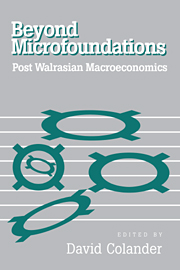Book contents
- Frontmatter
- Contents
- About the authors
- Preface
- 1 Overview
- I The Post Walrasian macroeconomic vision
- II The underpinnings of Post Walrasian macroeconomics
- III Modeling a Post Walrasian economy
- IV New structuralist macroeconomics vs. Post Walrasian macroeconomics
- IV Appendix: Literature Survey
- Name Index
- Subject Index
1 - Overview
Published online by Cambridge University Press: 05 June 2012
- Frontmatter
- Contents
- About the authors
- Preface
- 1 Overview
- I The Post Walrasian macroeconomic vision
- II The underpinnings of Post Walrasian macroeconomics
- III Modeling a Post Walrasian economy
- IV New structuralist macroeconomics vs. Post Walrasian macroeconomics
- IV Appendix: Literature Survey
- Name Index
- Subject Index
Summary
It has been 25 years since the microfoundations of macro became popular. The changes that have occurred in macro in these 25 years have been substantial. The whole conception of macroeconomics has changed from a Keynesian aggregate fine-tuning conception to a New Classical, policy-ineffective, microeconomic conception, to a New Keynesian “who knows what theory or policy to use” conception.
This book is an introduction to a line of thinking about the macro economy that stands in bold opposition to much of the macroeconomic literature not only of the last 25 years, but of much of the work of 25 years before that – the work that led to the microfoundations work. The approach to macro presented in this volume significantly differs from much of both Classical and Keynesian thought – whether prefixed by new, neo, or whatever. Thus, it is in opposition not only to the New Classical and New Keynesian macroeconomics of the last 15 years, but also to the NeoKeynesian and neoclassical macroeconomics of the last 50 years.
Given such strong claims it is only natural that one wonders how, after 50 years of development, can there be such a fundamentally different approach to macro? I can best answer that with an analogy. Say you are at the base of two mountains whose peaks are above the clouds. You want to climb to the higher peak which means that you must choose one of the two.
- Type
- Chapter
- Information
- Beyond MicrofoundationsPost Walrasian Economics, pp. 1 - 18Publisher: Cambridge University PressPrint publication year: 1996
- 2
- Cited by



